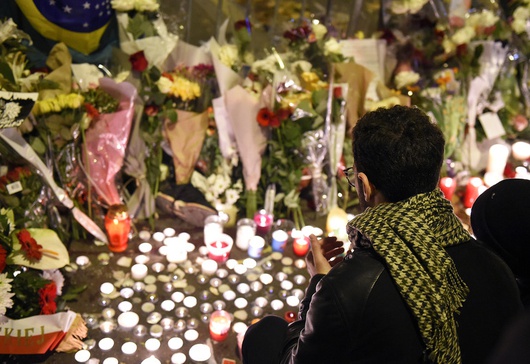![Image for [eng] Fight every aspect of Islamism: in Syria, Iraq, Iran.](https://media.cafebabel.com/resized-images/b1/d5/b1484f843db9f8660211a978071275231239.jpg)
[eng] Fight every aspect of Islamism: in Syria, Iraq, Iran.
Published on
Translation by:
Ugo Semat To accept that the Paris attacks are a "retaliation" to the French intervention in Syria is falling in the rhetorical trap of those wanting France to withdraw its involvement alongside the country's moderate opposition. A people fighting since 2011 against a despised regime supported by Iran and Russia, which butchered more than 250,000 Syrian citizens and engendered millions of refugees, using without hesitation chemical weapons and barrel bombs against defenceless populations.
To accept that the Paris attacks are a "retaliation" to the French intervention in Syria is falling in the rhetorical trap of those wanting France to withdraw its involvement alongside the country's moderate opposition. A people fighting since 2011 against a despised regime supported by Iran and Russia, which butchered more than 250,000 Syrian citizens and engendered millions of refugees, using without hesitation chemical weapons and barrel bombs against defenceless populations.
In a courageous political gesture, France was the first country to recognise the opposition's legitimacy and to fully defend a solution involving the international community, to help hinder the crisis' stalemate.
France is, in fact, paying for Washington's mistakes, the most blatant one being its retreat in august 2013. While the pressure was high around Bachar El Assad, Americans fell in the Iranian devilish strategic trap: to favour the emergence of Islamist extremists, who acted as a scarecrow, repulse a Western intervention, and present Assad as a wall capable to contain the Islamist rise.
To this extent, one can obviously speculate that Daesh is the product of the Iranian policy consisting in maintaining Assad in office at any cost. It is widely known that without a massive military support from the Iranian regime - with thousands of Pasdaran members and their allies from the Lebanese Hezbollah, as well as pro-Iranian militias from Iran and Afghanistan - Assad's regime would have fallen long ago.
As of today, we count between 15,000 and 20,000 pro-Iranians combatants within Syrian territory, as well as billions of dollars in financial supported brought by Tehran (15 to 35 billion dollars per year).
It comes as no surprise that after the terror attacks in Paris on nov. 13th, Iranian authorities rushed to blame France and its president, accusing him of helping the "terrorists". For them, the "terrorists" are not Daesh, but the moderate forces of the Syrian opposition, which have won considerable successes on the battlefield for months now.
Those striking advances are precisely what led the general of the iranian Pasdaran, Ghassem Soleimani, to travel to Moscow end of september to lobby in favour of a Russian intervention. Indeed, Iran alone no longer seemed capable to prevent the Syrian regime's retreat on almost every military front; these retreats had led to consider a regime collapse on short-term considerations.
As long as the Syrian regime is standing and continuing its war crimes, it remains the most fertile soil for Daesh. France's role is to work toward a general coalition against the Iranian presence in Syria and Assad's departure. The "third way" remains the only solution to solve the crisis in Syria. "Neither Daech nor Assad": what is need is to help local forces to free territories still under Daech's occupation today.
However, democratic forces in the Muslim world also need help in their struggle against Islamist extremism. In this regard, one needs to focus on Iran. It was the first Islamist state in the modern world. It was in 1979 indeed and with the arrival of Islamists in office in Iran that the seeds of the baneful Islamist phenomenon - today threatening as far as our French cities - were planted.
Proof of this is the fatwa issued on february 14th of 1989 demanding Salman Rushdie's execution - authored by ayatollah Khomeini, leader of the Iranian revolution, claiming his book The Satanic Verses was a blasphemy against Islam. On july 11th 1991, Rushdie's Japanese translator Hitoshi Igarashi was stabbed to death, few days only after the assassination of his Italian translator. In 1993 in Oslo, Rushdie's Norwegian editor miraculously survived several gunshots. In 2013, AQAP (Al-Qaeda in the Arabian Peninsula) pins the name of Stéphane Charbonnier, known as Charb, publication director from Charlie Hebdo since 2009, on the watchlist of public figures wanted for "crimes against Islam".
It seems obvious - while we cannot directly link the latest events to the Iranian administration - that we can undoubtedly draw a line between the 1989 fatwa and terror attacks in the name of Islam. One man, or one action, is always needed to lead the way to, as currently observed, violence, danger and hatred.
The democrats within the ranks of Muslims in these countries are also victims of the regime's extremism. Two weeks before the attacks in Paris, the tragedy in 'Liberty' occurred, a camp sheltering Iranian opposition members united in the National Council of Resistance of Iran (NCRI), which fights for democratic changes and the end of the Iranian "Supreme Guide" caliphate. During the deadly attack, 25 unarmed inhabitants were assassinated when 80 rockets were dropped on the camp.
The fight against religious extremism is a global one, and it needs to be addressed on all fronts. But one needs to recognise the fact that religious extremism stems historically and from Iran's Mullahs. The solution to avoid a fatal end to the conduct of the world is primarily through the definitive disappearance of Islamic integrism in Raqqa as much as in Tehran.
Translated from Combattre l’islamisme sous toutes ses formes, Syrie, Irak, Iran



